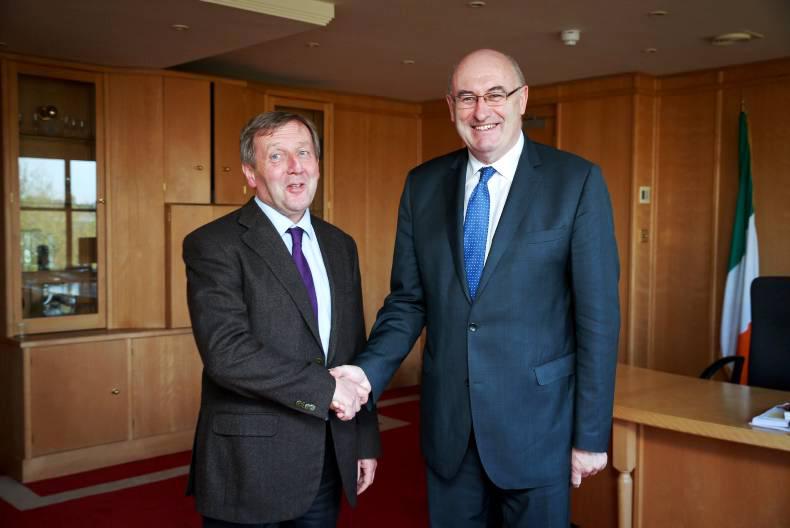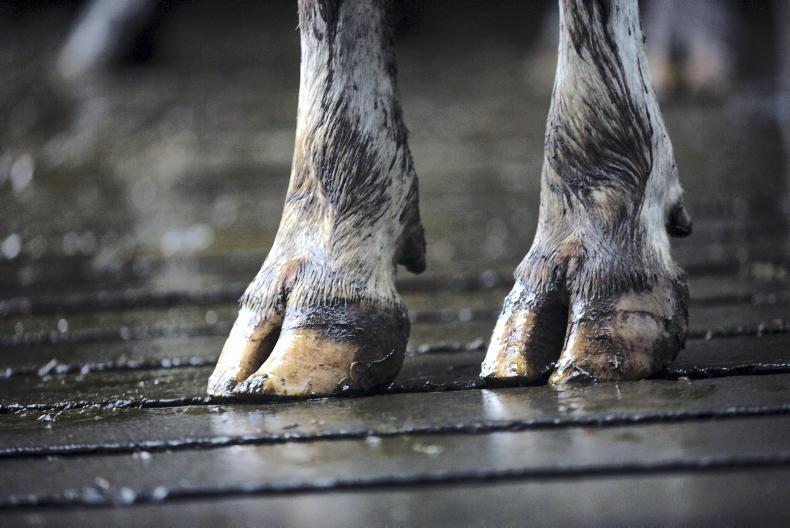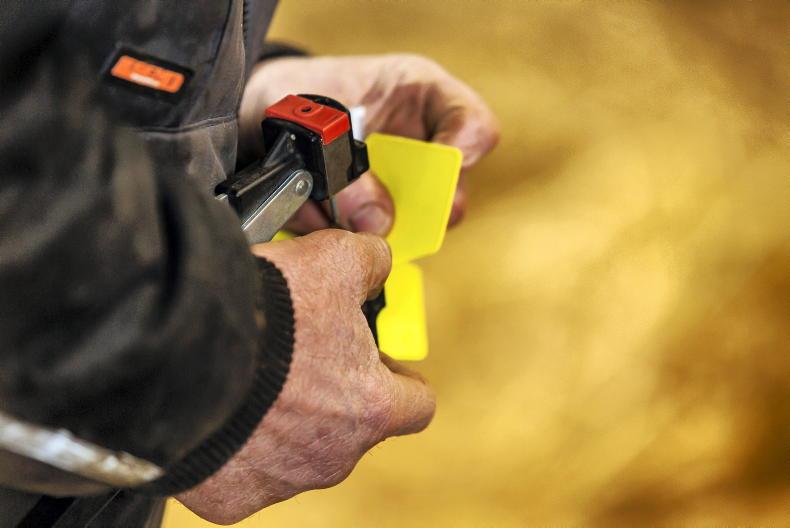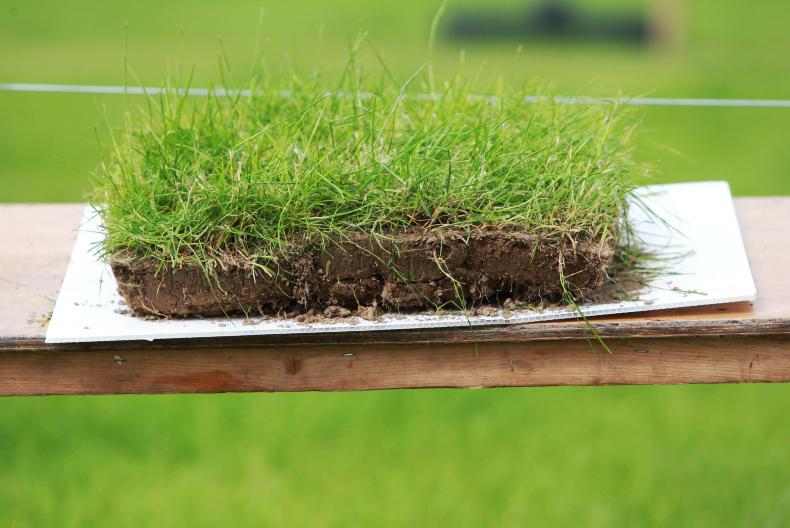Appointment: 6 May 2016
Fine Gael TD Michael Creed was appointed as Minister for Agriculture on Friday 6 May 2016 after Enda Kenny's successful last-ditch attempt to be re-elected as Taoiseach.
Creed, who was first elected to Dáil Éireann in 1989, has held several positions on the Fine Gael front-bench, including agriculture spokesperson between 2007 and 2010.
The appointment came as somewhat of a surprise for the man from Macroom, as he was on the wrong side of the leadership heave against Enda Kenny in 2010, and had effectively been left in the cold by the Taoiseach since then.
A former dairy farmer, Creed devised the dairy forum along with John Deasy and milked 50 cows prior to becoming a TD.
First IFJ interview: 12 May 2016
In his first interview with the Irish Farmers Journal, Creed confirmed that the announcement had come as a surprise but added: "If I was to be given any portfolio, there is no other I would have asked for".
Asked what the single issue was at the top of his agenda, he replied that "with farming, it's always incomes, incomes, incomes".
And at a time when many seemed immune to the possibility of a British exit from the EU, the new minister was clearly cognisant of Brexit's ramifications: “Right now, the one issue that is keeping me awake is the possibility of a British exit from the EU," he said. "We have to be careful and exhibit sensitivity, an inappropriate intervention would be potentially damaging to the outcome."
First announcements
One of the minister's first announcements was an endorsement of the new €25m sheep scheme and the €25m investment into the Areas of Natural Constraint budget included in the programme for Government.
Creed later confirmed to the IFA that EID tagging would not be made a compulsory element of the scheme, a move welcomed by the farm lobby group.
He also announced that he would be convening meetings of the dairy and beef forum in June. While the dairy forum took place in June, the beef forum did not take place until July.
First EU Farm Council meeting: 17 May 2016
Creed was perceived to have done well at his first Agriculture and Fisheries Council meeting, which took place only just over a week after his appointment.
Formally welcomed to my first Council of Agriculture & Fisheries meeting by my European colleagues #proudmoment pic.twitter.com/oOGZvgCoJk
— Michael Creed TD (@creedcnw) May 17, 2016
At the meeting Creed called on the Commission to re-examine the volume limit for fixed price intervention for Skimmed Milk Powder (SMP), saying that "intervention remains the most effective means available to deal with volatility".
The limit for SMP was later raised to 350,000t.
Creed also welcomed the publication by the EU Commission of the survey on animal welfare, and supported the implementation of an EU animal welfare platform.
TAMS delays: May and June 2016
However, it was not all plain sailing for the new minister, with the Department's delay in issuing approvals under the TAMS II scheme a real thorn in his side.
We followed this story closely since the end of March 2016, when the second tranche of TAMS II closed. We reported then that over 1,800 farmers were still waiting for approvals for their applications in the first tranche of TAMS II.
The Department of Agriculture said that the remaining approvals from the first tranche of TAMS II would flow after the end of March, but farmers were still waiting in April. By mid-May over 5,000 farmers were still awaiting approvals to start building work, some of whom had made their applications in 2015.
In his first podcast interview with the Irish Farmers Journal in mid-June, Creed affirmed that "approvals are issuing", and added that "if the Department is to be faulted for anything it is for ambition, having rolled out a full range of schemes at the earliest possible date".
The most recent update on this story is the pressure Creed is under to deliver on his word to have a TAMS II online payment facility in place this month.
Brexit result: 24 June 2016
The world found out that Britain had voted to leave the EU in the early hours of Friday 24 June. Despite being adamant before the vote that there was no upside to a Brexit for the Irish agri-sector, the minister quickly moved to reassure farmers that the Department of Agriculture is ready for what lies ahead.
In a statement to the Irish Farmers Journal earlier this month, the Department outlined the steps the minister is taking to deal with the threat Brexit poses to the Irish agri-food sector.
They shoot cattle, don't they?: 5 July 2016
It wasn't just TAMS approvals delays that placed the minister and his Department under intense scrutiny. In early July news emerged that five heifers had been shot by members of the armed forces as part of a debt recovery exercise. The news caused outrage among the farming community and made headlines in national media. Speaking the following week in the Dáil, Creed was forced to clarify whether the animals had TB and said the cattle were shot "as a last resort".
Ireland gets access to US market for manufacturing beef: 6 July 2016
On Wednesday 6 July, Creed announced that Ireland had secured access for Irish manufacturing beef to the US market.
Minister @creedcnw today announced that Ireland has secured improved access for Irish beef to the US market https://t.co/azK8USjugV @Bordbia
— Irish Consulate NYC (@IrelandinNY) July 6, 2016
Giving a nod to the work of his predecessor, Simon Coveney, Creed said the news "is the culmination of over a year of intensive work between my Department and its US counterparts".
EU dairy aid package: 18 July 2016
On 18 July, the Commission announced a €500m package to support European dairy farmers with Ireland receiving €11.1m of this for conditional adjustment aid.
Other measures included a 70% advance on the basic payment to take place on 16 October 2016, which Creed had called for before the package was announced.
Speaking to us after the announcement, Creed said he was happy with the €11.m for Ireland and added that it was a victory only €150m out of a €500m package had been allocated towards milk supply controls.
However, he has yet to give a formal commitment on whether the €11.1m will be matched by national funds or whether livestock farmers besides dairy will get a slice of the package.
Welcoming @PhilHoganEU €500 million aid package for the Agriculture sector particularly for Dairy @agriculture_ie pic.twitter.com/ZEDrL2YEPJ
— Michael Creed TD (@creedcnw) July 18, 2016
Climate change targets for 2030: 22 July
Ireland's target for the reduction of greenhouse gas emissions by 2030 was unveiled on Wednesday 22 July. The deal was seen as good for Ireland with the country having to cut emissions from sectors of its economy outside the Emissions Trading System (ETS) by 30% compared with 2005 levels. More importantly, Ireland is allowed to use the positive effects on greenhouse gas emissions from land use activities such as forestry or grassland management to justify up to 5.6% of its cuts in emissions - the highest flexibility offered to any other member state bar Latvia.
To his credit, Creed had met Miguel Arias Cañete, EU Commissioner for Climate Change, at a critical stage in the negotiations back in May "to push at EU level regarding the unmatched carbon efficiency of our grass based products" and to look for "full recognition of the role forestry plays as a carbon sink".
Challenges when Dáil returns
The most pressing challenges for the minister when the Dáil returns are to ensure co-funding of the €11.1m and to try and appease beef, sheep and dairy farmers when it comes to splitting up the money.
Next up is Budget 2017, for which the IFA will be presenting its proposals next week. Coveney was mostly praised for the work he did in previous budgets, especially the 2015 budget, when he introduced a raft of new agri-taxation measures aimed at increasing land mobility and assisting succession and the transfer of farms.
The former agriculture minister added to these measures in the 2016 budget, and also secured a €109m increase in spending for his Department, meaning Creed has fairly big boots to fill.
Comment
Since his appointment, Michael Creed has done well to slide almost seamlessly into the position held by his predecessor Simon Coveney. The breadth and depth of the agriculture portfolio is not to be underestimated and Creed has managed to take this in his stride, having performed well at the two agriculture ministers council meetings he has attended so far in Brussels.
Of course he was not the only minister looking for some of the dispensations granted to farmers at these two council meetings. All of Europe is in the throes of a dairy income crisis and many voices are better than one. It should also be noted that a precedent for the 70% advance on the basic payment and the raising of the intervention ceiling limit for SMP had already been set under Coveney's time as minister, making Creed's job that little bit easier.
And although it is certainly a victory that only €150m out of €500m was allocated towards milk supply controls in the July package, with France, Germany and Poland pushing for this side of things, Coveney had also made Ireland's view on controls very clear at the March council.
But it is also the case that TAMS delays could be attributed to the legacy of the former minister so, at such an early stage in his appointment, there is little that Creed can take full credit or criticism for.
And it will be impossible to please all of the people all of the time, with the minister's announcement on EID tagging pleasing the IFA, but not necessarily pleasing ICOS.
Creed is not only fighting for farmers, he is arguably fighting for his own seat at cabinet. The likelihood of a leadership challenge in Fine Gael is growing and with a new leader comes an inevitable reshuffle.
Creed's greatest strength is that he speaks farmer. He has a connection that, perhaps, his predecessor did not enjoy.
Only time will allow him to put his mark on the position. However, the new minister has a quiet confidence about him which suggests he is up for this challenge.










SHARING OPTIONS